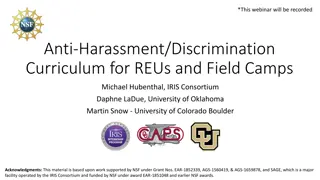Development of Indian Penal Code (IPC) 1860 and Its Impact in British India
The Indian Penal Code (IPC) of 1860 was introduced in British India after a series of historical events led to the need for a comprehensive criminal justice system. The disintegration of the Mughal Empire paved the way for British takeover, resulting in variations in criminal laws across different B
1 views • 24 slides
Understanding Murder in Common Law
Murder, as defined in common law, is the unlawful killing of a human being with malice aforethought. This act involves both actus reus (unlawful killing caused by the defendant) and mens rea (intention to kill or cause grievous bodily harm). Legal causation, including thin skull test, chain of causa
0 views • 18 slides
Understanding Criminal Elements and Intentions in State Laws
The prosecution needs to prove all elements of a crime beyond a reasonable doubt, including Mens Rea (mental intent) and Actus Reus (criminal act). Each state has its laws defining specific crime elements, sentences, and degrees of seriousness. Examples include arson, assault with intent, and unlawf
0 views • 17 slides
Managing Participant Support Costs for Undergraduate Research Experiences (REU)
Participant support costs for REU programs include stipends, travel allowances, and registration fees for non-employee participants. The Uniform Guidance outlines guidelines for allowable costs, while NSF provides stipend guidelines. Institutions like Brown University have specific procedures for st
0 views • 6 slides
Understanding Criminal Defenses and Legal Concepts
Explore the intricate realm of criminal defenses, from Mens Rea to Actus Reus, and delve into various defense strategies such as alibi, excuse defense, defense of self, property, and others. Uncover the nuances of legal concepts like infancy and not criminally responsible excuses in the context of c
3 views • 19 slides
Understanding Theft Offences: Elements and Case Law
Theft offences, including theft and robbery, are defined under the Theft Act 1968. A person is guilty of theft if they dishonestly appropriate property belonging to another with the intention to permanently deprive them of it. The elements of theft involve actus reus (appropriation) and mens rea (di
0 views • 26 slides
Anti-Harassment/Discrimination Curriculum for REUs and Field Camps
This curriculum addresses the need to educate individuals in REU programs on recognizing, responding to, and reporting harassment and discrimination. It emphasizes interactivity and practical resources to foster a culture of change in scientific workplaces. The material is supported by NSF grants an
0 views • 29 slides
Understanding Burglary Offences and Acts Reus in Property Crimes
Burglary is a serious property offence outlined in the Theft Act 1968, with distinct elements and penalties. The actus reus of burglary involves entry as a trespasser into a building with intent to steal, cause harm, or damage property. Differentiating between the offenses under section 9(1)(a) and
0 views • 11 slides
Understanding Robbery: Elements, Definition, and Distinctions
Robbery, defined under Section 8 of the Theft Act 1968, involves the act of stealing with the use of force or threat of force. This offense carries serious consequences, including a potential life imprisonment sentence. The key elements of robbery include the actus reus of theft and force, along wit
0 views • 11 slides
Understanding Robbery: Elements and Distinctions
Robbery, as defined in Section 8 of the Theft Act 1968, involves the act of stealing accompanied by the use of force or the threat of force to instill fear in order to commit the theft. This offense is considered more serious than theft and can lead to a life imprisonment sentence. The key elements
0 views • 11 slides









